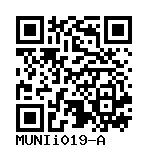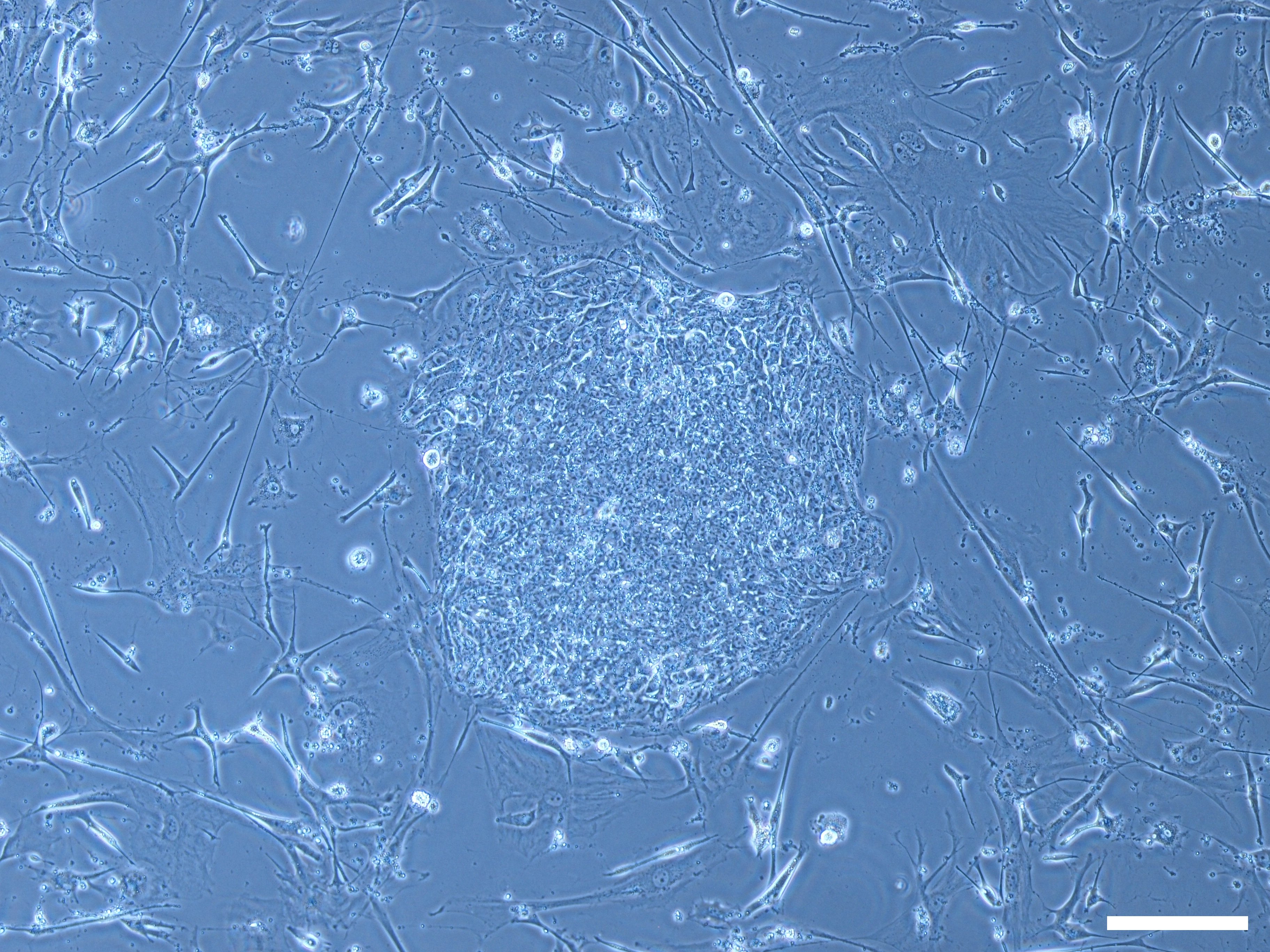NBS-M, NBS
MUNIi019-A
General
Cell Line |
|
| hPSCreg name | MUNIi019-A |
| Cite as: | MUNIi019-A (RRID:CVCL_D0JR) |
| Alternative name(s) |
NBS-M, NBS
|
| Cell line type | Human induced pluripotent stem cell (hiPSC) |
| Similar lines | No similar lines found. |
| Last update | 6th February 2025 |
| User feedback | |
Provider |
|
| Generator |
Masaryk University (MUNI)
Contact:
Masaryk University (MUNI) |
| Owner | Masaryk University (MUNI) |
| Distributors | |
| Derivation country | Czech Republic |
External Databases |
|
| BioSamples | SAMEA112863139 |
| Cellosaurus | CVCL_D0JR |
| Wikidata | Q123033131 |
General Information |
|
| * Is the cell line readily obtainable for third parties? |
Yes Research use: allowed
Clinical use: allowed
Commercial use: allowed
|
Donor Information
General Donor Information |
|
| Sex | male |
| Age of donor (at collection) | 10-14 |
| Ethnicity | Caucasian |
Phenotype and Disease related information (Donor) |
|
| Diseases | A disease was diagnosed.
|
Karyotyping (Donor) |
|
| Has the donor karyotype been analysed? |
No
|
Other Genotyping (Donor) |
|
| Is there genome-wide genotyping or functional data available? |
No
|
External Databases (Donor) |
|
| BioSamples | SAMEA112861290 |
Ethics
| Has informed consent been obtained from the donor of the embryo/tissue from which the pluripotent stem cells have been derived? | Yes |
| Was the consent voluntarily given? | Yes |
| Has the donor been informed that participation will not directly influence their personal treatment? | Yes |
| Can you provide us with a copy of the Donor Information Sheet provided to the donor? | Yes |
| Do you (Depositor/Provider) hold the original Donor Consent Form? | No |
| If you do not hold the Donor Consent Form, do you know who does? | Yes |
| Alternatives to consent are available? | No |
| Is there other documentation provided to the donor for consenting purposes? | No |
| Confirm that consent was obtained by a qualified professional | Yes |
| Has the donor agreed to be re-contacted? | Yes |
| Has the donor been informed about how her/his data will be protected? | Yes |
| Please indicate whether the data associated with the donated material has been pseudonymised or anonymised. | pseudonymised |
| Does consent explicitly allow the derivation of pluripotent stem cells? | Yes |
| * Does consent expressly prevent the derivation of pluripotent stem cells? | No |
| * Does consent pertain to a specific research project? | Yes |
| Details on restriction to research project | Name of the project in Czech language: Identifikace nových terapeutických cílů a personalizovaný management imunodeficience a nádorů pacientů trpících Nijmegen breakage syndromem. |
| Does consent permit unforeseen future research, without further consent? | No |
| Does consent expressly prevent development of commercial products? | No |
| Does consent expressly prevent financial gain from any use of the donated embryo/tissue, including any product made from it? | No |
| Does consent expressly permit storage of donated embryo/tissue for an unlimited time? | Yes |
| Does consent expressly permit storage of cells derived from the donated embryo/tissue for an unlimited time? | Yes |
| Does consent prevent the DONATED BIOSAMPLE from being made available to researchers anywhere in the world? | No |
| Does consent prevent CELLS DERIVED FROM THE DONATED BIOSAMPLE from being made available to researchers anywhere in the world? | No |
Does consent permit research by | |
| an academic institution? | Yes |
| a public organisation? | Yes |
| a non-profit company? | Yes |
| a for-profit corporation? | Yes |
| Does consent expressly permit collection of genetic information? | No |
| Does consent expressly permit storage of genetic information? | No |
| Does consent prevent dissemination of genetic information? | No |
| Has the donor been informed that their donated biosample or derived cells may be tested for the presence of microbiological agents / pathogens? | Yes |
| Has the donor consented to receive information discovered during use of donated embryo/tissue that has significant health implications for the donor? | Yes |
| How may genetic information associated with the cell line be accessed? | Controlled Access |
| Will the donor expect to receive financial benefit, beyond reasonable expenses, in return for donating the biosample? | No |
| Does the consent anticipate that the donor will be notified of results or outcomes of any research involving the donated samples or derived cells? | No |
| Does the consent permit the donor, upon withdrawal of consent, to stop the use of the derived cell line(s) that have already been created from donated samples? | No |
| Does the consent permit the donor, upon withdrawal of consent, to stop delivery or use of information and data about the donor? | No |
| Does consent permit access to medical records of the donor? | No |
| Does consent permit access to any other source of information about the clinical treatment or health of the donor? | No |
| Has a favourable opinion been obtained from a research ethics committee, or other ethics review panel, in relation to the Research Protocol including the consent provisions? | Yes |
| Name of accrediting authority involved? | Ethical committee of University Hospital Brno |
| Approval number | 27-240620/EK (19.06.2020) |
| Has a favourable opinion been obtained from a research ethics committee, or other ethics review panel, in relation to the PROPOSED PROJECT, involving use of donated embryo/tissue or derived cells? | Yes |
| Name of accrediting authority involved? | Ethical committee of University Hospital Brno |
| Approval number | 27-240620/EK (19.06.2020) |
| Do you have obligations to third parties in regard to the use of the cell line? | No |
| Are you aware of any further constraints on the use of the donated embryo/tissue or derived cells? | No |
| For generation of the cell line, who was the supplier of any recombined DNA vectors or commercial kits used? | CytoTune™-iPS 2.0 Sendai Reprogramming Kit, Thermo Fisher Scientific |
| Are you aware of any constraints on the use or distribution of the cell line from the owner or any parties identified in the query above? | No |
hIPSC Derivation
General |
|
| Source cell type |
Any skin fibroblast that is part of some dermis.
|
| Age of donor (at collection) | 10-14 |
| Passage number reprogrammed | P4 |
Reprogramming method |
|
| Vector type | Non-integrating |
| Vector | Sendai virus |
| Is reprogramming vector detectable? |
Yes |
| Methods used |
PCR
|
| Notes on reprogramming vector detection | RT-PCR analysis |
| Files and images showing reprogramming vector expressed or silenced | |
Vector free reprogramming |
|
| Type of used vector free reprogramming factor(s) |
mRNA
|
| mRNA | |
Other |
|
| Selection criteria for clones | Tra-81 live staining |
| Derived under xeno-free conditions |
No |
| Derived under GMP? |
No |
| Available as clinical grade? |
No |
Culture Conditions
| Surface coating | Gelatin | ||||||||||||||||||
| Feeder cells |
MEF |
||||||||||||||||||
| Passage method | Mechanically | ||||||||||||||||||
| O2 Concentration | 5 % | ||||||||||||||||||
| CO2 Concentration | 5 % | ||||||||||||||||||
| Medium |
Other medium:
Base medium: DMEM F12
Main protein source: Knock-out serum replacement Serum concentration: 15 % Supplements
|
||||||||||||||||||
| Has Rock inhibitor (Y27632) been used at passage previously with this cell line? | Yes |
||||||||||||||||||
| Has Rock inhibitor (Y27632) been used at cryo previously with this cell line? | No |
||||||||||||||||||
| Has Rock inhibitor (Y27632) been used at thaw previously with this cell line? | No |
Characterisation
Analysis of Undifferentiated Cells
| Marker | Expressed | Immunostaining | RT-PCR | Flow Cytometry | Enzymatic Assay | Expression Profiles |
| POU5F1 (OCT-4) |
Yes |
|||||
| NANOG |
Yes |
|||||
| TRA 1-81 |
Yes |
|||||
| SSEA-4 |
Yes |
Alkaline phosphatase (AP) activity
Method documentation
NBS_AP.png
NBS colony positive for AP expression, scale bar = 200 um
Differentiation Potency
In vitro directed differentiation
| Marker | Expressed |
| AFP – alpha fetoprotein |
Yes |
Protocol or reference
AFP.png
Expression of alpha 1 fetoprotein mRNA
In vitro directed differentiation
| Marker | Expressed |
| TBXT T-box transcription factor T |
Yes |
Protocol or reference
T.png
Expression of brachyury mRNA
In vitro directed differentiation
| Marker | Expressed |
| PAX6 paired box 6 |
Yes |
Protocol or reference
PAX6.png
Expression of PAX6 mRNA
Genotyping
Karyotyping (Cell Line) |
|
| Has the cell line karyotype been analysed? |
Yes
|
Other Genotyping (Cell Line) |
|



Login to share your feedback, experiences or results with the research community.